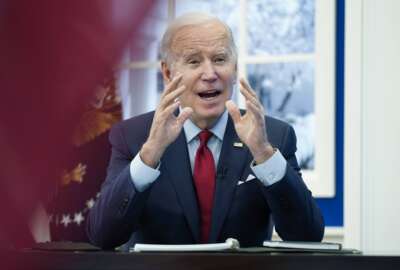After six years, OPM has a permanent inspector general
The Office of Personnel Management’s permanent inspector general says she will prioritize IT modernization and cybersecurity out of nearly 400 open...
The Office of Personnel Management has its first permanent inspector general in six years.
Krista Boyd’s unanimous confirmation by the Senate comes after President Joe Biden nominated her to the role in September 2021. Previously, Boyd served as chief counsel for oversight and policy for the House Committee on Oversight and Reform.
At her nomination hearing on March 10, Boyd said that she would make open recommendations for OPM a priority. Currently, there are almost 400 open recommendations from the OIG that are over six months old.
“It’s really important that the OIG stay on top of OPM efforts to protect its information. There are a number of outstanding open recommendations from the OIG now that have been uncovered during FISMA audits. And it’s really important for OPM to address those open recommendations,” Boyd said.
Of all those open recommendations, conducting rigorous oversight of OPM’s information technology modernization and cybersecurity efforts will be top priorities, Boyd said in her nomination hearing testimony.
“It’s really important that the agency be leading first with security,” Boyd said. “And so that’s something I would want to work on with the OIG, to ensure that there’s strong oversight happening of OPM’s efforts to ensure that they are leading first with security.”
Boyd also said that she is committed to maintaining transparency and working in a nonpartisan manner. That comes after some members of Congress expressed concerns about her ability to remain impartial after working as part of the committee’s Democratic staff.
In response, Boyd pointed to her bipartisan work, particularly in uncovering fraud, waste and abuse in government spending.
“I understand very well the role that inspectors general play in serving independently to really conduct strong oversight, and that oversight is especially needed at OPM,” Boyd said.
Boyd’s role as permanent IG will also include confronting OPM’s top management challenges, which the IG office outlined in a report from October 2021.
The agency considered its four top management challenges for fiscal 2022 as “the continuing shortfall in OPM’s funding, which relates to budgetary issues impacting OPM; the financial integrity of OPM’s trust funds, which impacts OPM’s Federal Employees Health Benefits, Life Insurance and Retirement Programs; information technology; and OPM challenges which are government-wide,” the report stated.
Prior to Boyd’s confirmation, Norbert Vint served as OPM’s acting IG. Vint took over the position after Patrick McFarland, who served as IG for 31 years, stepped down in 2016.
At the time of his departure, McFarland said he was pleased with the balance that his office was able to achieve in providing scrutiny and oversight for OPM.
“I intended to build a professional relationship that fosters cooperation, but which at the same time, recognizes that the inspector general’s legal and primary responsibility is to search for wrongdoing,” McFarland wrote in his February 2016 resignation letter. “Both of these elements — independence and cooperation — are essential to the success of any OIG.”
Filling a role that’s been vacant for six years raises questions for some groups about the nomination and confirmation process. Across government, the IG position has one of the longest wait times between nomination and confirmation, the Partnership for Public Service reported.
Between 1990 and 2020, it has taken an average of 121 days for the Senate to confirm IGs. The Partnership’s Vice President for Government Affairs Kristine Simmons told the Senate Committee on Homeland Security and Governmental Affairs that there are concerns about the efficiency of the confirmation process.
“Administrations will traditionally hold over individuals in these positions because they are appointed without regard to political affiliation and perform an essential management function,” Simmons stated. “Over the years, this committee has expressed bipartisan concern about vacant inspector general positions and has urged administrations of both parties to nominate qualified candidates to serve in Senate-confirmed inspector general roles.”
On top of efficiency for getting nominees confirmed by the Senate, the Government Accountability Office looked into the effectiveness of acting IGs for agencies that were missing a permanent one.
In general, having an acting IG instead of a permanent position-holder didn’t affect the OIG’s ability to execute on its duties and responsibilities, GAO’s October 2018 report stated. But, one of the main differences rested in the perception of authority, rather than actual variance in the role.
“While the majority who responded did not think that acting IGs are inherently less independent, they did indicate by a similar majority that an acting IG is less independent in appearance than a permanent IG, especially when the acting IG is applying for the IG position,” GAO stated.
An acting IG can also vary from a permanent one in terms of assertiveness, according to Ron Sanders, former chairman of the Federal Salary Council from 2017 to 2020 and current staff director for the Florida Center for Cybersecurity at the University of South Florida.
“If you’re in an acting capacity, and your job is to root out waste, fraud and abuse, you’re probably not going to be as aggressive as you would be if you were confirmed by the Senate to be the permanent Inspector General for an agency,” Sanders said.
But, Sanders added, that determination is largely up to the individual. Some acting IGs will still be aggressive while leading an agency’s IG office.
In general, there’s also higher level of gravitas when it comes to having a permanent position-holder for an IG office. That’s according to Mark Robbins, a former MSPB board member and former general counsel for OPM.
“Having a confirmed head is important because it gives that office a certain authority that establishes that both this administration and Congress will take them more seriously,” Robbins said.
But specifically for OPM, Robbins said the IG office has still functioned well under Vint.
“The acting inspector general for the last few years has met all of the legal responsibilities,” Robbins said. “The administrations at OPM have worked well with him. So I think the impact is more one of perception than reality in OPM’s case.”
In the last six years, OPM’s acting IG has faced a lot of challenges in the role, according to Dan Blair, who served as deputy director for the Office of Personnel Management during the George W. Bush administration.
The acting IG “took on the OPM GSA merger issues and continues to evaluate OPM’s IT and cybersecurity activities,” Blair said.
Having a permanent IG, though, will add a layer of authority to the office. Boyd’s role will initially involve establishing a rapport with the agency.
“How the IG approaches and works with management is largely going to be a product of the relationship that she establishes with the agency head,” Blair said. “The biggest initial challenge is coming in to lead an organization that has not had a confirmed head since 2016 — adjusting the organization to her, and her adjustment to the organization.”
Copyright © 2025 Federal News Network. All rights reserved. This website is not intended for users located within the European Economic Area.
Drew Friedman is a workforce, pay and benefits reporter for Federal News Network.
Follow @dfriedmanWFED






